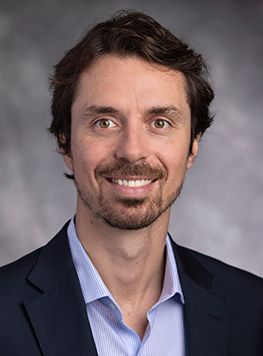Improving Cancer Care Through Cooperation
Pedro Barata, MD, MSc, discussed the importance of the NRG Oncology Semiannual Meeting and the forum it provides for oncologists to collaborate and optimize cancer treatment.
Pedro Barata, MD, MSc

The NRG Oncology Semiannual Meeting took place in Orlando, Florida, from February 15 to 17, 2024, and provided an opportunity for oncologists across the country to meet, learn, and discuss innovations in the field. One of those oncologists was Pedro Barata, MD, MSc, who believes in the value NRG provides in moving cancer science forward and improving patient care.
In an interview with Targeted OncologyTM, Barata, medical oncologist specializing in genitourinary (GU) tumors at University Hospitals in Cleveland, Ohio, highlighted the importance of NRG in bringing together experts from different specialties to collaborate on cancer research. He also discussed the group's work in developing new treatments and identifying biomarkers to optimize patient selection for these therapies.
Targeted Oncology: What is the goal of the NRG Meeting?
Barata: NRG is one of the most important cooperative groups out there. A number of physicians and researchers get together on a regular basis and try to develop concepts that ultimately will help patients. We try to answer questions that are relevant to patients. It’s an organization that has the ability to get together colleagues and experts from different specialties, including radiation oncology, urology, medical, oncology, imaging, etc. I think their role in helping moving science forward for the treatment of cancer is super important and has been for a long time.
What unmet needs exist across the field of oncology?
Unfortunately, we cannot cure all patients that come to us with cancer. NRG has the ability to work on the different stages of the cancer. Not all patients are cured with the current approaches, and NRG helps us to fill in that gap. It helps also to bring together novel treatments, either by itself or combined with other modalities. Another way is to develop biomarkers. How can we optimize the patients who will benefit from those novel therapies? I think NRG, specifically the translational groups, has been able to leverage on the data being produced from prior trials to understand what biomarkers can come out of that, [and] us to optimize the patients who are more likely to benefit from those therapies or those strategies.
The portfolio includes studies all the way from early-stage disease to advanced disease, which is obviously an unmet need, because patients present at different stages. There is that effort for doctors and researchers to get together and try to answer these specific questions in early disease, recurrent disease, advanced disease, etc. I think there are a number of areas where we have, and we are trying to do better. I think NRG is providing their valuable contribution towards answering and understanding the questions that need to be answered for our patients.
What would the takeaways of this meeting be for a community oncologist?
There are certain things that you can only do by meeting with each other. There is a limit to how many emails and can circulate, so having a couple of days dedicated to this, that means folks all around the country get together and talk about those issues that we alluded to earlier. They talk about concepts, they talk about what works, what does not work, they get all the different perspectives. They try to understand what is likely to move forward, what is feasible, who’s on board with it, and how to prioritize the different projects when you have fantastic people. NRG has a lot of smart, intelligent, outstanding experts. There are a lot of great questions and great concepts being thrown at the group that need to be debated and discussed, and ultimately, you need to prioritize what to do, because the resources are not unlimited. Getting together to do just that is important.
There are these meetings twice a year: the winter and the summer meeting. That [gives] an opportunity to be there, and [we] are completely committed to that. I think the meetings are relevant and help all the researchers to achieve those goals and get work done.
How do you structure your meeting?
I participate in the young investigators committee, so that's 1 part. I try to participate in all the GU closed and open meetings. That includes prostate, kidney, bladder, other rare GU tumors, [and] that includes translational medicine meeting. That is a great opportunity, for me, at least to go through the portfolio. Some studies I know better than others, so it is a way to remind myself of the portfolio, what studies we can bring back to our institution, and finally, what concepts are being worked on and who are the players that you want to talk to provide your feedback. All of that is how I structure in my mind the NRG meeting.
Survivorship Care Promotes Evidence-Based Approaches for Quality of Life and Beyond
March 21st 2025Frank J. Penedo, PhD, explains the challenges of survivorship care for patients with cancer and how he implements programs to support patients’ emotional, physical, and practical needs.
Read More